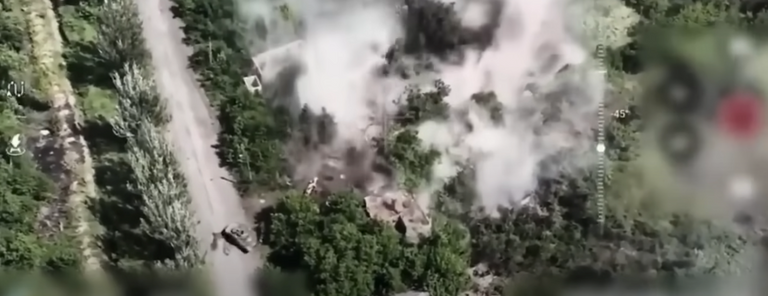The statement "As Russia's war with Ukraine continues, the question now is less whether Ukraine can stay in the fight and more how long can Russia maintain its current tempo of operations" suggests a significant shift in the perception of the ongoing conflict. This change in narrative could have important implications for investors across various sectors.

Ukrainian tank pumps shells into house
Changing War Dynamics
Ukraine's Resilience: The statement implies that Ukraine has demonstrated unexpected staying power in the conflict. This resilience could impact investments in Ukrainian assets and neighboring countries.
Focus on Russia's Capabilities: The shift to questioning Russia's ability to maintain its operations suggests potential weaknesses or strains on Russian resources.
Investment Considerations
Defense Sector: Continued conflict might sustain demand for defense equipment, benefiting companies in this sector. However, the focus on Russia's capabilities might indicate a potential slowdown in the future.
Energy Markets: Russia's ability to maintain operations could affect its oil and gas exports. Investors should monitor energy prices and related stocks, especially in Europe.
Commodity Markets: Ukraine and Russia are significant exporters of grains and metals. The conflict's duration and intensity could continue to impact global commodity prices.
Currency Markets: The perception of Russia's military capabilities might influence the ruble and currencies of neighboring countries. Forex traders should stay alert to these potential shifts.
Emerging Markets: The prolonged conflict could have ripple effects on emerging market investments, particularly in Eastern Europe.
Reconstruction Opportunities: As Ukraine continues to resist, there may be growing interest in companies positioned for post-war reconstruction efforts.
Sanctions and Global Trade: The duration of Russia's military campaign could influence the longevity and severity of international sanctions, affecting global trade patterns and multinational corporations.
Long-term Outlook
The statement suggests a potential war of attrition, which could have lasting economic impacts:
- Increased global defense spending
- Reshaping of energy supply chains, especially in Europe
- Long-term commodity market volatility
- Geopolitical realignments affecting trade relationships
For investors, this shift in the war's narrative emphasizes the need for a flexible, long-term approach. While the immediate focus might be on Russia's capabilities, the broader implications of a prolonged conflict should be factored into investment strategies.
Key areas to watch include defense stocks, energy markets, commodity prices, and companies with significant exposure to the affected regions. Additionally, the potential for unexpected geopolitical developments remains high, underscoring the importance of diversification and risk management in investment portfolios.
As always, investors should stay informed about geopolitical developments and consider consulting with financial advisors to navigate the complex interplay between global events and market dynamics.